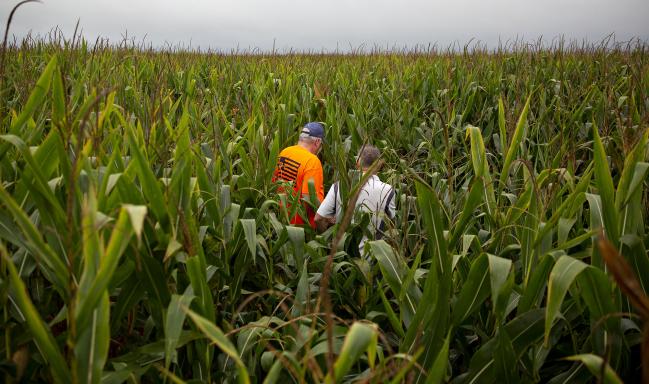(Bloomberg) -- Top Trump administration officials met Thursday to consider options for quelling a backlash in politically important farm states over recent biofuel policy moves, including revoking waivers given to some oil refineries from requirements they use renewable fuel such as corn-based ethanol.
The Agriculture Department pushed that idea in the meeting and in a memo explicitly outlining options for President Donald Trump amid intense opposition from the Environmental Protection Agency, which administers the program that mandates biofuel. Thursday’s meeting follows a flurry of White House conversations this week on the issue, according to people familiar with the deliberations who asked not to be named before any formal announcement.
After Bloomberg reported the news, biodiesel maker Renewable Energy Group Inc. surged as much as 7%, the steepest gain in two months while U.S. ethanol producer Green Plains Inc. climbed as much as 3.6%. Corn futures also advanced. Gasoline futures fell for the first time in a week.
The administration is trying to blunt anger in Iowa and other states critical to the president’s re-election, as Trump’s political allies in the Midwest blast the EPA’s Aug. 9 decision to waive 31 oil refineries from 2018 quotas encouraging the use of ethanol and soybean-based biodiesel. But any shift to favor agricultural interests over oil companies could also have political implications in Pennsylvania and other campaign battleground states, by angering blue-collar refinery workers and oil industry benefactors.
‘Regain Support’
In Thursday’s meeting, administration officials discussed a series of possible policy changes that had been outlined by Agriculture Secretary Sonny Perdue in an Aug. 20 memo obtained by Bloomberg. “By taking decisive action now,” Perdue said in the memo, “I believe we can regain support among farmers and the biofuel industry.”
Perdue recommended rescinding some of the oil-refinery exemptions that had been granted to “big” companies -- about seven to eight of the recent batch of 31 -- despite warnings from top EPA officials the revocations could be illegal.
The Agriculture Department, which didn’t immediately respond to a requests for comment, also recommended reallocating some of the biofuel quotas that were waived and that are expected, beginning with a final regulation setting biofuel targets for 2020, expected by Nov. 30.
The agency also is seeking a formal role in dictating the targets for the next two years and helping shape the future of the Renewable Fuel Standard, the 2005 law that compels refiners to use biofuel.
The White House was already reviewing a drafted EPA “RFS reset” rule that did not make broad changes to the program, but Perdue described it as “negative toward biofuels and contrary” to the president’s “stated support” for the law. That regulation could be a vehicle for more ambitious biofuel-blending requirements.
The EPA also should take steps to speed the adoption of E15 gasoline that contains 15% ethanol, Perdue said, and encourage flex-fuel vehicles that can run on an 85% blend.
Refinery Risks
As top Trump administration officials weighed options this week, oil companies and their congressional allies made the case that any shift could alienate refinery workers and voters in swing states the president won in 2016.
Rescinding the waivers is “likely to inflict far more political damage given the likely reaction of unions, political supporters and businesses in key battleground states like Pennsylvania and even Texas,” Scott Segal, a Bracewell lobbyist who works with refiners, said late Wednesday.
Federal law authorizes the EPA to issue exemptions waiving refineries from RFS mandates in cases of economic hardship. But ethanol and biodiesel producers say the Trump administration has handed out those waivers too freely, hurting demand for their products, amid a trade dispute with China that has already caused economic pain.
EPA officials and refiners dispute that waivers have hurt domestic ethanol demand. Agricultural economist Scott Irwin asserted Thursday that the rate at which ethanol has been blended into gasoline has not fallen, though he said exemptions have hurt demand for E85 and E15.
(Updates with details of Perdue memo from fifth paragraph)
